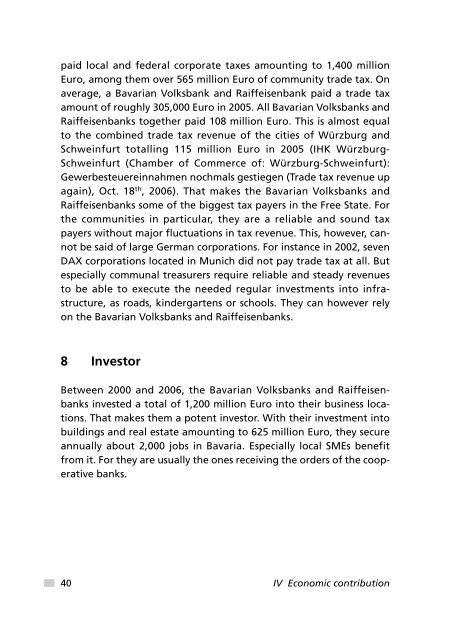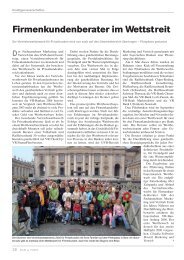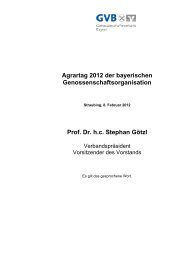Introduction - Genossenschaftsverband Bayern
Introduction - Genossenschaftsverband Bayern
Introduction - Genossenschaftsverband Bayern
You also want an ePaper? Increase the reach of your titles
YUMPU automatically turns print PDFs into web optimized ePapers that Google loves.
paid local and federal corporate taxes amounting to 1,400 million<br />
Euro, among them over 565 million Euro of community trade tax. On<br />
average, a Bavarian Volksbank and Raiffeisenbank paid a trade tax<br />
amount of roughly 305,000 Euro in 2005. All Bavarian Volksbanks and<br />
Raiffeisenbanks together paid 108 million Euro. This is almost equal<br />
to the combined trade tax revenue of the cities of Würzburg and<br />
Schweinfurt totalling 115 million Euro in 2005 (IHK Würzburg-<br />
Schweinfurt (Chamber of Commerce of: Würzburg-Schweinfurt):<br />
Gewerbesteuereinnahmen nochmals gestiegen (Trade tax revenue up<br />
again), Oct. 18 th , 2006). That makes the Bavarian Volksbanks and<br />
Raiffeisenbanks some of the biggest tax payers in the Free State. For<br />
the communities in particular, they are a reliable and sound tax<br />
payers without major fluctuations in tax revenue. This, however, cannot<br />
be said of large German corporations. For instance in 2002, seven<br />
DAX corporations located in Munich did not pay trade tax at all. But<br />
especially communal treasurers require reliable and steady revenues<br />
to be able to execute the needed regular investments into infrastructure,<br />
as roads, kindergartens or schools. They can however rely<br />
on the Bavarian Volksbanks and Raiffeisenbanks.<br />
8 Investor<br />
Between 2000 and 2006, the Bavarian Volksbanks and Raiffeisenbanks<br />
invested a total of 1,200 million Euro into their business locations.<br />
That makes them a potent investor. With their investment into<br />
buildings and real estate amounting to 625 million Euro, they secure<br />
annually about 2,000 jobs in Bavaria. Especially local SMEs benefit<br />
from it. For they are usually the ones receiving the orders of the cooperative<br />
banks.<br />
40 IV Economic contribution
















